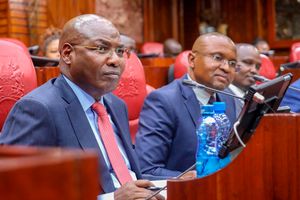Ruto offers hospitals pay deal to end SHA boycott

Health Cabinet Secretary Deborah Barasa (right) interacts with a patient at the maternity wing of the Nanyuki Teaching and Referral Hospital in Laikipia County on February 4, 2025.
President William Ruto has directed the immediate payment of all hospitals owed up to Sh10 million by the now-defunct National Health Insurance Fund (NHIF) as the government moves to address a growing healthcare crisis.
Private hospitals have been boycotting the Social Health Authority (SHA), leaving thousands of patients stranded as they demand upfront payments for medical services.
The president acknowledged that the government inherited a crippling NHIF debt of Sh33 billion following its dissolution on November 22, 2024, which has affected the ability of health facilities to provide services under SHA.
“This has had a devastating effect on the provision of healthcare in public, faith-based, and private hospitals,” President Ruto stated, offering a payment plan aimed at resolving the impasse that has left patients suffering.
“To comprehensively deal with this challenge, the government has resolved to pay all hospitals with total claims of Sh10 million and below in full, representing 91 per cent of all facilities that were contracted by NHIF,” he ordered.
He added that the remaining nine per cent of hospitals, whose claims exceed Sh10 million, will undergo a verification exercise within 90 days, after which a payment plan will be agreed upon.
The president also announced that the Health Cabinet Secretary will gazette a verification committee within a week. He said that under SHA, all current claims will continue to be paid within a month, stating that to date, the authority has disbursed Sh18.2 billion for undisputed claims lodged between October 1, 2024 and January 31, 2025.
“The government is fully committed to providing Universal Health Coverage to every Kenyan without discrimination. Any challenges in the implementation of Taifa Care are being addressed and resolved,” he assured.
Despite the president’s intervention, Kenyans continue to bear the brunt of the transition from NHIF to SHA, with hospitals rejecting SHA claims due to delayed reimbursements.
Patients in dire need of dialysis, cancer treatment, and other critical services, especially in private hospitals, are being forced to pay cash or forgo treatment altogether. Hospital pharmacies have also refused to dispense medication unless payments are made upfront.
For thousands of Kenyans who relied on NHIF for life-saving treatments, the transition to SHA has become a nightmare, marked by confusion, financial strain, and denial of care.
“Last week, my children pooled money to pay for my dialysis - over Sh30,000 for three sessions. This week, I have already skipped one session. I am waiting for them to raise more money because my hospital does not accept SHA,” said Mr Phillip Kababi, a dialysis patient.
At Gendia Mission Hospital, a Level 4 facility in Homa Bay County, families are being forced to pay out of pocket for laboratory services.
“We had to pay Sh8,400 for four tests because SHA does not cover them,” one patient lamented.
This reality is being felt across the country as patients who have already contributed to the SHA scheme find themselves paying cash again for medical services that were supposed to be covered.
On February 24, the Rural and Urban Private Hospitals Association of Kenya (Rupha) and the Kenya Association of Private Hospitals declared an indefinite suspension of SHA services due to unpaid claims and financial distress.
“We cannot keep treating patients for free. SHA owes us millions, yet we have salaries to pay, drugs to buy, and bills to settle,” said Dr Brian Lishenga, chairperson of Rupha.
A Rupha report released yesterday revealed that seven out of ten nurses in private and faith-based hospitals have been laid off due to financial constraints caused by delayed payments.
The crisis has led to the dismissal of 66 per cent of nurses, 56 per cent of clinical officers, 41 per cent of laboratory staff, 34 per cent of pharmacy staff, and 30 per cent of medical officers.
Dr Lishenga noted that 82 per cent of hospitals have scaled down operations over the past 12 months, affecting clinical units, administrative departments, diagnostic units, and operating theatres. Some hospitals have even shut down entire branches.
“We have seen an increase in voluntary resignations, indicating a worsening crisis in workforce retention,” he added.
For Kenyans without national identification cards, the situation is even worse. Many hospitals are turning them away, citing SHA’s biometric verification requirements.
“I lost my ID last year. They told me I needed it to be treated under SHA. I was in so much pain, I had to borrow money and pay cash,” said John Ochieng, a boda boda rider from Kisumu.
Dr Lishenga told Nation that verification and registration challenges remain unresolved, limiting access to care for insured patients.
RUPHA has also criticised SHA’s reimbursement model, which proposes paying hospitals less than Sh75 per outpatient per month.
“This model is unworkable. It prevents hospitals from paying doctors and nurses, procuring life-saving drugs, and maintaining operations. We will not attend to patients under these conditions,” Dr Lishenga said.
He warned that the model poses a direct threat to patient safety, forcing hospitals into cost-cutting measures that compromise the quality of care.
As a result, two in five hospitals have been forced to require out-of-pocket payments, increasing financial hardship for patients. Additionally, 51 per cent of hospitals reported turning away insured patients due to uncertainty over claim approvals.
“Some providers have stopped offering certain services, while others have scaled down care for SHA beneficiaries due to financial instability. Patients now face longer wait times or outright denial of treatment,” Dr Lishenga said.





